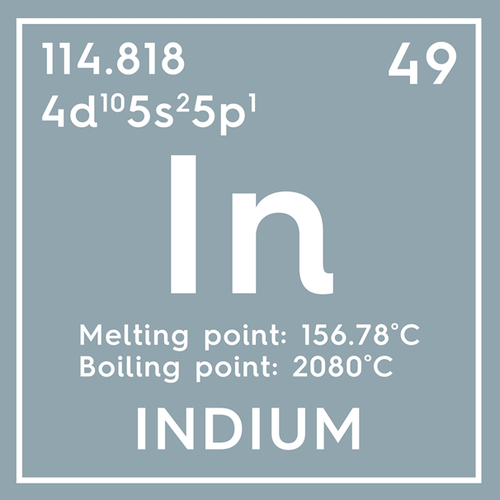
Indium
Scientific names: Indium, In, atomic number 49
Alternate names: Chlorure d'Indium, Colloidal Indium, Indio, Indium (III), Indium Chloride, Indium Colloïdal, Indium Compound, Indium Octreotide, Indium Pentetreotide, Indium Phosphide, Indium Salts, Indium Sulfate, Indium Sulfate Anhydrous, Indium Sulphate, Indium Tin Oxide, Indium Trichloride, Indium-111, Indium-111-octreotide, Indium-111-pentetreotide, Numéro Atomique 49, OctreoScan, Pentétréotide d'Indium, Phosphure d'Indium, Préparation d'Indium, Sels d'Indium, Sulfate d'Indium, Trichlorure d'Indium
Background
Indium is a soft, silver-white metal used in manufacturing. It is chemically similar to aluminum and gallium. Indiums most common industrial use is in electrodes used for liquid crystal displays (LCDs). Some dietary supplements contain indium.
People use indium for fatigue, aging, boosting the immune system, and increasing hormone production, but there is no good scientific evidence to support these uses. Using indium orally can also be unsafe.
Healthcare providers sometimes give an FDA-approved prescription product called indium (In-111) pentetreotide by IV to help diagnose certain types of cancer.
People use indium for fatigue, aging, boosting the immune system, and increasing hormone production, but there is no good scientific evidence to support these uses. Using indium orally can also be unsafe.
Healthcare providers sometimes give an FDA-approved prescription product called indium (In-111) pentetreotide by IV to help diagnose certain types of cancer.
Safety Safety definitions
When taken by mouth: Indium is POSSIBLY UNSAFE when taken by mouth. Indium is thought to be toxic to many parts of the body.
When given by IV: Indium is LIKELY SAFE when the prescription product containing indium (In-111) pentetreotide is given by IV by a healthcare professional.
When given by IV: Indium is LIKELY SAFE when the prescription product containing indium (In-111) pentetreotide is given by IV by a healthcare professional.
Special Precautions & Warnings:
Pregnancy and breast-feeding: Taking indium by mouth or as an IV is POSSIBLY UNSAFE. The effects of indium on an unborn infant or a nursing infant are unknown. But indium is thought to be toxic to many parts of the body. Stay on the safe side and avoid use.Effectiveness
NatMed Pro rates effectiveness based on scientific evidence according to the following scale: Effective, Likely Effective, Possibly Effective, Possibly Ineffective, Likely Ineffective, Ineffective, and Insufficient Evidence to Rate.
Effective Effectiveness definitions
- Diagnosing cancer. An FDA-approved prescription drug, called indium (In-111) pentetreotide, is used by healthcare professionals to find certain tumors inside the body. It is given by IV.
Insufficient evidence Effectiveness definitions
- Aging.
- Fatigue.
- A condition caused by poor diet or the body's inability to absorb nutrients.
- Boosting the immune system.
- Increasing hormone production.
- Other conditions.
Dosing & administration
The appropriate dose of indium depends on several factors such as the user's age, health, and several other conditions. At this time there is not enough scientific information to determine an appropriate range of doses for indium. Keep in mind that natural products are not always necessarily safe and dosages can be important. Be sure to follow relevant directions on product labels and consult your pharmacist or physician or other healthcare professional before using.
Interactions with pharmaceuticals
It is not known if Indium interacts with any medicines. Before taking Indium, talk with your healthcare professional if you take any medications.
Interactions with herbs & supplements
There are no known interactions with herbs and supplements.
Interactions with foods
There are no known interactions with foods.
Action
There isn't enough reliable information available to know how indium might work.
vital.ly has licensed monographs from TRC Healthcare.
This monograph was last reviewed on 23/10/2022 20:12:37 and last updated on 26/12/2012 18:18:36. Monographs are reviewed and/or updated multiple times per month and at least once per year.
Natural Medicines disclaims any responsibility related to medical consequences of using any medical product. Effort is made to ensure that the information contained in this monograph is accurate at the time it was published. Consumers and medical professionals who consult this monograph are cautioned that any medical or product related decision is the sole responsibility of the consumer and/or the health care professional. A legal License Agreement sets limitations on downloading, storing, or printing content from this Database. No reproduction of this monograph or any content from this Database is permitted without written permission from the publisher. It is unlawful to download, store, or distribute content from this site.




